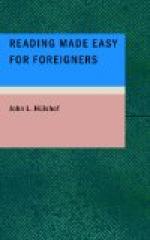Not a great many years was Washington permitted to enjoy his well-merited repose in his country home. The same country of which he had been the successful liberator, now called upon him to lead and guide this newly established government. Washington was chosen the First President of the United States of America in 1789.
It was at this time that he wrote in his diary: “To-day I take leave of private life and domestic happiness with feelings of regret, and am preparing to enter upon my official career. I hope I shall be able to realize the expectations my country has placed in me.”
His journey from Mount Vernon to New York became one of triumph. He was met with the greatest enthusiasm throughout the country wherever he passed. He took his oath of office in New York City where the sub-treasury now stands.
Washington was elected a second time for the presidency. His presidential career was characteristic of the man and the hero.
An equitable and conservative government was administered by him, and the young republic was prosperous and progressive during his two terms of office.
Having returned once more to his beloved Virginia home, Washington now spent his declining years in much needed rest and quiet recreation.
In the fall of the year 1799 Washington was seized with a malignant fever. The best medical aid proved unavailing, and the Father of our Country died on the 14th day of December. His last words were: “Let me die in peace; I am not afraid to die, it is a debt we all must pay.”
The exemplary life and the many noble achievements of this truly great man stand almost unique in the history of nations.
LESSON LXVI
BENJAMIN FRANKLIN
Benjamin Franklin was born poor, but nothing could keep him ignorant. His genius and strong will were wealth enough for any man. At the age of twelve he was apprenticed to his brother James, who was a printer. At the same time—perhaps a little later—he used to sell his own ballads in the streets of Boston.
At twenty-one years of age he was a master printer in Philadelphia, in his shop on Market Street. He had been at school in Boston for two years, but after the age of ten he had been obliged to teach himself: he was too poor to spend even those early years in a schoolhouse. Yet he learned without such helps as schools and schoolmasters afford. He studied Latin, French, Italian, Spanish, and German, and lived to hear two continents call him the greatest philosopher of his time.
He discovered that lightning and electricity are the same, and taught men how to guard their houses against the thunder-bolt. To his great mind it seemed that all things came alike: no invention was too simple, and no idea too lofty. Whatever had to be done was worth doing in the best and simplest way: that was the ruling principle of Benjamin Franklin’s life.




